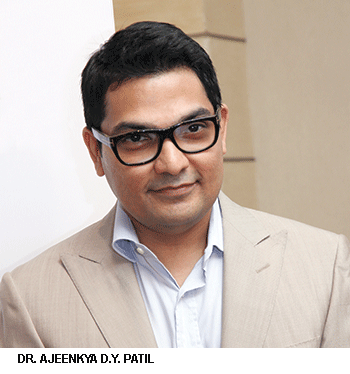 Change is invariably the result and objective of all revolutions — peaceful and bloody. Change is also the outcome when revolutionary technologies disrupt age-old businesses and traditional education systems. This is what we are witnessing today on a global scale with pioneering new technologies such as Artificial Intelligence (AI), Virtual Reality (VR) and 3D printing. These radical breakthroughs are set to change the world like never before and humanity needs to be prepared to manage them.
Change is invariably the result and objective of all revolutions — peaceful and bloody. Change is also the outcome when revolutionary technologies disrupt age-old businesses and traditional education systems. This is what we are witnessing today on a global scale with pioneering new technologies such as Artificial Intelligence (AI), Virtual Reality (VR) and 3D printing. These radical breakthroughs are set to change the world like never before and humanity needs to be prepared to manage them.
In a 2009 essay written by economist Stephen Moore for the Wall Street Journal, he describes a famous interaction with Nobel Prize economist Milton Friedman. “At one of our dinners, Milton recalled travelling to an Asian country in the 1960s and visiting a worksite where a new canal was being built. He was shocked to see that, instead of modern tractors and earth movers, the workers had shovels. When he asked why there were so few machines on site, a government bureaucrat explained: ‘You don’t understand. This is a jobs generation programme.’ To which Milton replied: ‘Oh, I thought you were trying to build a canal. If its jobs you want, you should give these workers spoons, not shovels.’”
Over the past several millennia, the population of planet Earth has exploded to 7 billion and the vast majority needs to be employed to earn their daily bread. Paradoxically, revolutionary new technologies which are making our personal lives easier, are leaving a huge number of burnt out empty factories and jobless people in their wake. Responsive governments are taking notice. Reskilling and aligning school, college and university curricula to prepare millennials for jobs of the future has become normative in Western countries.
India’s National Association of Software & Services Companies (NASSCOM) has identified 55 new job roles and 155 new-age skills that will be urgently required in the near future for graduates entering the workforce. Already a massive shift in higher education is happening: learning is now automated and available 24/7 to those who can access it. The world’s best lectures and lecturers are digitised on YouTube, and online education is the new darling of venture capitalists.
The writing on the wall is clear. Students should become familiar with Virtual Reality, the Internet of Things, Big Data Analysis, Robotic Process Automation, Cloud Computing and have a good grasp of tools that make social media an effective ally in promoting their careers.
Undoubtedly, the astonishing growth and evolution of the Internet has made technical knowledge available at the fingertips of all who want it. However, for generation next, digital empowerment (and life skills) should be combined with deep understanding of the human condition. I describe this combination as the New Humanities, a special type of social ergonomics that has become critical to the definition and development of advanced societies.
In the circumstances, it’s high time India’s laggard education institutions pick up the baton and start adopting and integrating digital technologies into their curricula. The fact that we live in a fast globalising knowledge economy should spur school teachers and university professors to leapfrog from theoretical explanations of concepts to teaching practical application of disruptive new technologies and prepare students for jobs of the future.
To conceptualise and implement change in the education sector, curriculum frameworks should develop the following capabilities.
Non-cognitive capabilities — empathy, creativity and sensitivity. Life skills indicative of emotional intelligence will become important attributes which will differentiate winners from the losers in the future. Machines can’t mimic or ‘learn’ emotional intelligence. Therefore, educationists and teachers who start paying attention to developing the EQ (emotional quotient) of their students right now will give their pupils a head start. Microsoft, Facebook, Tesla Motors and Google reportedly spent more than $1 billion (Rs.6,500 crore) in 2015 researching EQ life skills.
Spirituality. Somewhat paradoxically, even as the march of machines and artificial intelligence is becoming unstoppable, spiritual education and awareness is becoming increasingly important for success in the 21st century. I believe that faith, belief and values will become central to humanity despite (or because of) our increasing reliance on AI and machines. For example, while the popular perception is that only backpackers visit India, quite to the contrary, a large and growing number of people, both young and old, from around the world and within India are finding mental peace and spiritual fulfillment in ashrams across the country.
The study and teaching of New Humanities — the capability to differentiate men from machines, our capacity to harmonise and empathise with each other, and absorption of the essence of spirituality — will be critical for people to enjoy peace and prosperity in the future.
(Dr. Ajeenkya D.Y. Patil is president of Ajeenkya D.Y. Patil University, Pune)